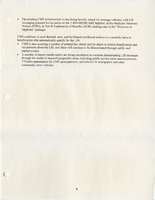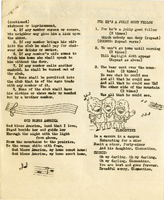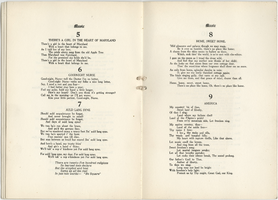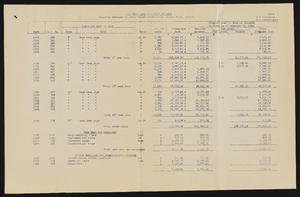Search the Special Collections and Archives Portal
Search Results


The Wheel of Rotary Las Vegas Rotary Club newsletter, September 8, 1949
Date
Archival Collection
Description
Text

Transcript of interview with Arthur "Art" Lurie by Cheryle Bacot, April 25, 1986
Date
Archival Collection
Description
Interview with Arthur "Art" Lurie by Cheryle Bacot on April 25, 1986. Lurie talks about his family and upbringing with Kenny Washington, who was the first African American to sign with the National Football League. Lurie discusses knowing everybody in Las Vegas in the 1950s, being in the service/retail sector and watching the city grow. He operated several businesses including grocery stores and the liquor department at Wonder World. He talks about his love of boxing, serving on the boxing commission, and advantages of living in southern Nevada.
Arthur C. Lurie lived in Las Vegas for 33 years at the time of this 1986 oral history. He and his wife Eleanor had relocated from Los Angeles area to help run his brother-in-law's food market. Over the years his career would include the grocery, bar (Art's Place) and restaurant businesses; including being co-owner of the liquor store at Wonder World. He shares memories of adjusting to the more laid back culture of small town Las Vegas and how he feels like a native after watching the city grow over the past decades. Art was a founding member of Temple Beth Sholom, where he served as an early vice-president. Being in the non-gaming sector provided gave him the opportunity to work with youth programs and he started the Golden Gloves gym in Las Vegas. He judged over 40 title fights and had a long career on the Nevada Boxing Commission. Arthur Lurie past away in 2014 at the age of 96.
Text
UNLV Libraries Collection of MGM Mirage Corporation Promotional Materials and Reports
Identifier
Abstract
The UNLV Libraries Collection of MGM Mirage Corporation Promotional Materials and Reports includes promotional materials, newspaper and magazine clippings, financial reports, annual reports, diversity reports, press releases, and press kits for the MGM Mirage Corporation in Las Vegas, Nevada, dating from 1973 to 2007.
Archival Collection
Ralph Denton Legal Papers
Identifier
Abstract
The Ralph Denton Legal Papers (1950-1993) consist of case files and legal briefs of civil rights attorney Ralph Denton. The cases largely involve civil rights issues and property claims in Las Vegas, Nevada. The files include cases representing individuals as well as companies such as Henderson Telephone Company, Lephrechaun Mining Company, and the Jockey Club Casino.
Archival Collection
Terry Wilsey Papers on the Las Vegas, Nevada LGBT Community
Identifier
Abstract
The Terry Wilsey Papers on the Las Vegas, Nevada LGBT Community (1979-2002) are comprised of records from the Las Vegas Gay Switchboard, the Nevadans for Human Rights, and other LGBT community groups based in Las Vegas, Nevada. The collection contains newsletters, agendas and meeting minutes, informational pamphlets, as well as photographs, programs, and a VHS recording of local theatre productions.
Archival Collection
Robert B. Griffith Photograph Collection
Identifier
Abstract
The Robert B. Griffith Photograph Collection (approximately 1950-1970) contains black-and-white and color photographic prints, negatives, and slides of Las Vegas, Nevada including Fremont Street, Helldorado parades, and hotel and casino properties along the Strip including the Sahara Hotel and Casino, the Flamingo Las Vegas, the El Rancho, the Thunderbird Hotel and Casino, and the Hotel Last Frontier. Also included are photographs of Lake Mead Recreation Area and tunnel drilling within and near the Las Vegas Valley, Nevada. Other Nevada locations outside of Las Vegas include Reno, Virginia City, and Crystal Bay, Nevada.
Archival Collection
George Laurence Ullom Photograph Collection
Identifier
Abstract
The George Laurence Ullom Photograph Collection (1915-1974) contains photographic prints and negatives created by Las Vegas, Nevada photographer George Laurence "Larry" Ullom. Larry owned and operated Ullom’s Desert Art Studio, which was located in Las Vegas, Nevada. The bulk of the collection consists of Ullom's wedding chapel photography. The collection also includes his photography work for the Bureau of Reclamation, the Agricultural Extension Service, and the Associated Press, Atlantic News, and Acme news bureaus.
Archival Collection


